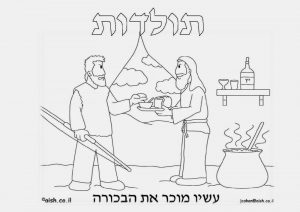 Banjul :18:18-19:11, Bamako: 17:45-18:38, Dakar :18:19-19:13, Masvingo 18:03-18:59, Kinshasa : 17:39-18:32, Abuja : 17:49-18:42, Lagos : 18:10-19:02, Enugu : 17:53-18:46, Abia : 17:56-18:48, Delta : 17:57-18:49, Anambra :17:55-18:48, Imo : 17:57-18:49, Harare : 17:58-18:53, Yaoundé : 17:41-18:33, Antananarivo : 17:54-18:50, Accra : 17:25-18:18
Banjul :18:18-19:11, Bamako: 17:45-18:38, Dakar :18:19-19:13, Masvingo 18:03-18:59, Kinshasa : 17:39-18:32, Abuja : 17:49-18:42, Lagos : 18:10-19:02, Enugu : 17:53-18:46, Abia : 17:56-18:48, Delta : 17:57-18:49, Anambra :17:55-18:48, Imo : 17:57-18:49, Harare : 17:58-18:53, Yaoundé : 17:41-18:33, Antananarivo : 17:54-18:50, Accra : 17:25-18:18
It is in the Parshah Toldot that the famous episode of the blessing obtained by the ruse by Jacob, to the detriment of his elder Esau, appears. The text tells us beforehand that Isaac preferred Esau because he put game in his mouth; but Rebecca preferred Jacob “(Genesis 25,28). It is difficult to understand how Isaac our father, a prophet moreover, could prefer Esau the hunter to Jacob the man of the spirit. But the perplexity increases when we stop at the reason invoked by the Torah: “Isaac preferred Esau, because he put game in his mouth”!
Can it be explained that Isaac thought he should privilege Esau the hunter rather than Jacob the honest man, living studiously in the tents of Chem and Ever, to pursue the Abrahamic vocation, and what does this tell us for gastronomic considerations?
Complexity in father-son relationships
We must return to the Akeda, Isaac’s sacrifice, to apprehend a complexity in father-son relations, which a superficial reading of the text does not allow to filter. Isaac’s ligation is a dramatic and traumatic moment for both father and son. What we are not always attentive to is that the descent of the Akeda, the paths of Abraham and Isaac will separate to no longer join. They will not see again. The biblical text like the Midrash raises strong questions about the relations of Abraham and Isaac. A Midrash quoted by Rashi (1) reveals the identity of the two young men who escort Abraham and Isaac on the ascent to the Moriah, with a view to of sacrifice: they would be none other than Ishmael and Eliezer! How to understand that after Ishmael was removed and banished on the instigation of Sarah, Abraham went to seek him, and this specifically to accompany him in the gesture of the Akeda?
Moreover, the text tells us that “Abraham gave all that he possessed to Isaac” (Gen.25.5), privileging him among others in relation to his other sons, and in particular Esau, but on the other hand we did not We have no trace of any exchange between Abraham and Isaac since the Akeda! We only see Isaac next to his father to bury him: “He was buried by his sons Isaac and Ishmael” (Gen.25,9). It is also observed that Abraham’s preparations for seeking a wife for his son are done in the absence of the future fiancé. Finally, even as our ancestors took their last moments to bless their children, we do not see that Abraham blessed Isaac at that time, leaving it to God to do so: “After Abraham’s death, blessed lord Isaac his son; Isaac is established near the source of the Living-who-see-me (Gen.25,11). How to understand that the text only relates an exchange between them, – which is located during the climb to the Moriah – and that from there their paths will be totally disjoined to no longer cross again?
The trauma of Akeda
Apart from the totally traumatic side of the Akeda, one can easily imagine that it is hardly easy to be the son of Abraham: universally recognized charismatic spiritual leader, victorious military leader, religious visionary of genius chosen by D. for carry out a social and religious revolution, not less. It might seem to Isaac that his older brother Ishmael, “the man whose hand was on everything”, was in a natural way, the strong leader, does much more than himself, to succeed Abraham their father.
Moreover, could not Isaac be tormented permanently by the fact that without the divine intervention which had finally spared him, Ismael would have lost the mission to continue the paternal mission? One might think that from that point on, Isaac was always tempted to think that basically his father had in fact preferred his older son to be more aggressive, stronger, rather than him, designated by D. as the spiritual heir of Abraham. Is this doubt that never stopped tapping him, that would have led him to think that finally it was his strongest son, the hunter, able to feed him too, Esaû, who was the most apt to take over?
But G-d makes things differently. Rebecca knows that the birthright does not belong
to the strongest son, but to the one who identifies most passionately with the spiritual mission committed by Abraham.
